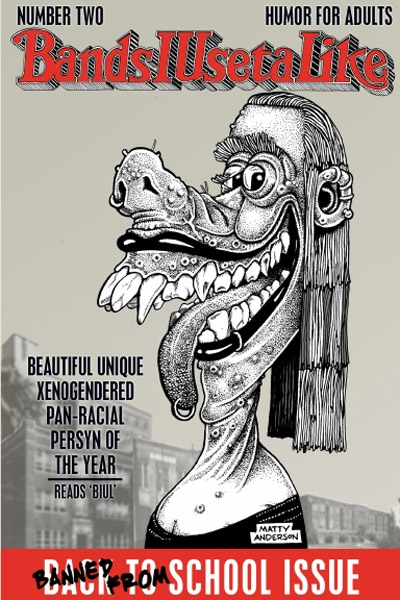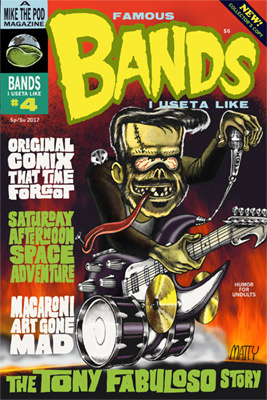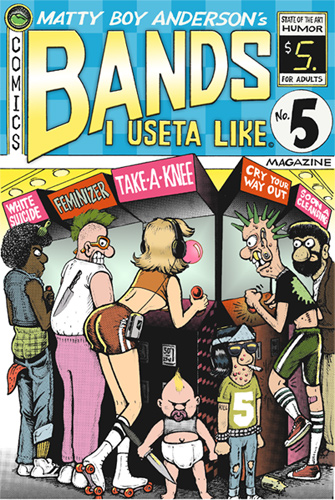Comedian Gregg Turkington created the Neil Hamburger persona in the 1990s; a bespectacled, bilious nightclub performer with an impossibly greasy comb-over, a bowtie, and three cocktails tucked under his arm. I first saw him on the talk show Tom Green used to broadcast from his LA home, and it was obvious even then that Turkington was crafting a comedy image on par with Tony Clifton, or Otto & George.
Turkington teamed up with Tim Heidecker, of Tim & Eric, and Rick Alverson, an independent filmmaker from Spokane, to create a film based around a variation of “Neil Hamburger”, following his off-stage life. Instead of maudlin Mr. Saturday Night pathos, they chose to emulate Monte Hellman’s excellent Two-Lane Blacktop, painting a bleak picture of a lonely man who alienates and is alienated. I haven’t been haunted by a movie like this since Gummo. I watched it twice the first day, and twice the next. It got into my skull like a mutant earwig.
Neil (Turkington) endlessly tours clubs and private venues around the deserts of California, clearly stuck in a rut. He uses what little money he makes on gas and motel rooms, which aren’t always available, meaning he has to lodge with kindly Mexicans. In the daytime, Neil visits dessicated tourist traps, like oil fields and airplane boneyards.
Turkington’s face is expressive in a way that you hardly see anymore. He barely speaks or emotes at all when he isn’t performing, even when leaving voicemails to his estranged daughter Maria, who is never seen. The camera lingers on him, and his eyes reveal miles of personal pain held just barely in check. He is compelling in every frame.
(Note: the tour guide at the boneyard is a grown-up Annabelle Lwin, the hot young tart from Bow Wow Wow, but she’s framed in a wide shot and very hard to see clearly.)
Neil’s opener on the “tour” is a much younger man in clown-face (Tye Sheridan), who does a high-energy sort of dirty mime act. He is the happy counterweight to Neil’s misery, and tries to cheer him up, out of respect and gratitude. We first see him performing an act with a rubber ball, for a captive audience of California prisoners. The ball represents the attentions of the crowd. He bounces it, tosses it, and finally drops it to the floor, standing motionless. After a long pause, he springs to life, dancing on the tables.
This demonstrates the basic nature of entertainment. A measure of time wherein attention and preconceived notions are subverted, for the purpose of distraction. From one’s problems, one’s life, one’s environment. And oftentimes, making a living as an entertainer is like panning for gold on the beaches of the Abyss.
Despite his mostly combative and unappreciative audiences, Neil’s jokes are piss-yourself funny. He punctuates the silence with cringe-inducing whimpers and guttural throat noises, and the crowd audibly groans in disgust. It feels as real as Andrew Dice Clay’s seminal The Day The Laughter Died, where Dice showed up at a huge club unannounced, with no material, and instead berated the audience for two hours. In Entertainment, I repeatedly forgot I was watching a “film”, and not impromptu footage.
Backstage before a gig, Neil lubes down his hair and prepares. I was absolutely reminded of Meade Roberts’ character from Killing of a Chinese Bookie. This is the only performance I’ve seen in years with that kind of lost dimension and theatrical grit.
At a bar where Neil bombs terribly (as always), his wealthy landowner cousin John appears for support, played by John C. Reilly. I would call Reilly one of America’s greatest treasures. I’ve been enjoying his work since 1989’s Casualties of War, and he might be the best character in Boogie Nights. He’s a fine actor, and funny incarnate. He was the sole aspect of Magnolia that didn’t infuriate me.
John suggests to Neil that maybe audiences would be more receptive if he didn’t mention semen. I tell you as both a humorist and a black sheep; this was one of numerous scenes that utterly broke my heart. The road to Hell is paved with good intentions, and never forget what Durante said: everyone wants to get in on the act.
Neil is repeatedly asked to perform on the spot by people who take him in, which he refuses. This is another pitfall of being an entertainer; people can’t understand that you don’t always want to perform, and certainly not for nothing. Your skills have monetary value, which makes you feel insulted if you’re asked to give them away. Meanwhile, everyone is disappointed.
Cousin John has a single-engine plane, and flies Neil out to his orange grove; he grows them, but cannot eat them. Back at his palatial plantation, John introduces Neil to a Mexican man and woman who maintain his vast property. The woman is a classically beautiful senorita, and the man is an older, traditional patriarch who speaks no English. This is one of the more subtle “worth the price of admission” scenes, as John resentfully asides to Neil about Mexican “bullshit”.
Wandering the halls of yet another hotel, Neil stumbles into a seminar held by a color therapist, played by Dutch actress Lotte Verbeek. Mark Donne’s score is especially resonant here; he uses strings and minor chords on flutes to build an environment on the fringe of a nervous breakdown. If Lotte Verbeek doesn’t have an American accent in real life, which I bet she doesn’t, her work here is even more impressive. She is a striking woman, with Sissy Spacek eyes and perfect posture, despite looking like she weighs about 90 pounds soaking wet.
Neil falls asleep in her seminar, and after they meet in her room, she leads him to a booth lit with magenta bulbs, where she will observe him as he sits and tries to sleep. This entire movie is like the onset of an anxiety attack. Neil has at least two panic seizures before the film is over, and I tell you from personal experience, they’re authentic.
The malaise and futility of a career as an entertainer are illustrated beautifully by Turkington. Every day Neil seems ready to give up, but nothing in the real world entices him. It’s exactly the mindset that constant touring creates. Neil has no home. He accepts a job from some dilettante bloggers with a vague concept, who lead him deep into the desert, only to see him sneak off while they take forever to set up a camera. You can see the exact moment where he thinks to himself “what the fuck am I doing?” Getting lost in the desert is preferable to suffering fools.
At his next club show, Neil lashes out at a woman who accidentally interrupts his joke, taking her for a heckler. He goes all out, insulting her in the most vulgar fashion possible, as she stares at him in disbelief. The woman is played by actor and independent director Amy Seimetz. I don’t know what this says about me as a person, but I found the scene where Seimetz stares Neil down before finally assaulting him to be so hot, I almost paused the DVD to jack off. That hasn’t happened since the lesbian scene in Mulholland Drive.
Lost in the desert at night, Neil parks at a rest stop to use the bathroom. While there he is cornered by Michael Cera, as quick-talking “Tommy”. I’ve never been a huge fan of Cera’s, but I’m telling you, one of these days he’s going to play a psycho killer, and scare hell out of everybody. This is an absolutely nerve-shredding scene, as Neil has a low-level anxiety attack. I came pretty close myself.
In the final act of the film, Neil performs for a bunch of methed-up weirdos, in a trailer park. A guy who sounds like Mark the Bagger argues with a tweaker about yellow motorcycle rims, an underage-looking girl smokes a joint, and as Neil silently contemplates this horrific tableau, a lone cockroach skitters up the paneling behind him. Later, he is reluctantly dragged to some sort of redneck bacchanal, where everyone is naked in the darkness. It’s impossible to get comfortable here.
On his way out of town, Neil stops in another rest area bathroom. At first it seems like turning on the faucet causes an unseen woman to scream. Neil cautiously investigates as the screams continue, following them into the women’s bathroom. What follows is the most disturbing sequence I’ve seen outside of a Gaspar Noe or Lars Von Trier film. See it for yourself. Don’t be a pussy. I warned you.
The climax of this scene is very well-delivered (pun intended). It’s brutally shocking, but not gratuitously so. I was numb afterward.
Time passes. Neil’s new opener is a Dane Cook type with a terrible bit about vaginas. At a tiny function, Neil has had enough when he takes the stage. His joke about the paparazzi with a heart of gold is half-hearted, even for Neil. Fed up with the smattering of bored spectators, he wanders over to a display of trophies, and picks up a nice one. He tucks it under his arm, faces the audience, and One Of The Funniest Scenes Ever begins. I have rewound this scene twenty times. It makes me laugh so hard, the muscles around my eyelids clench, and my diaphragm cramps. We’re talking full-on, third-grade laughter fits.
I can’t describe Neil’s bit here and do it any kind of justice. You have to see it for yourself. Better yet, when you see it, remember my recommendations here, and you’ll laugh even harder. Please try not to die. Gregg Turkington breathed life into something that I will celebrate him into futurity for. If Otto Petersen were still alive and somehow aware of me, I could talk about how great this scene is with he and Jim Norton; they would love it. Had I seen this in a theater, I’d have been on my feet applauding, if I were left able to stand. That’s how funny this scene is. That’s entertainment.
In the final fifteen minutes, Neil has a harrowing time at the optometrist, and a worse one when he can’t perform for a Celebrity (Tim Heidecker) at a lavish Hollywood Hills house party. Neil is made to emerge from a giant cake and is humiliated, causing a full-blown panic seizure. It is grueling to witness. Turkington holds absolutely nothing back.
Dean Stockwell drops in as the Celebrity’s accomplice, and at first glance I took him for Clint Eastwood. That Dean is always really something. He’s been in movies since before your parents were born.
I would place Entertainment alongside Scorcese’s The King of Comedy as a dark exploration of the life and mind of an unsuccessful comedian. Nothing gets resolved, much like Buñuel’s Discreet Charm of the Bourgeoisie. If you view it repeatedly, as I did, the themes of creative anguish and futility grow more and more visible. It’s alternately the funniest and most depressing movie I’ve seen in quite some time. The pointlessness of the entertainer’s existence mirrors that of our own.
Entertainers are like tour guides, celebrating dead aircraft and fossil fuels being pumped from dry earth. Whether the tourists are there or not hardly matters in the end.























You must be logged in to post a comment.